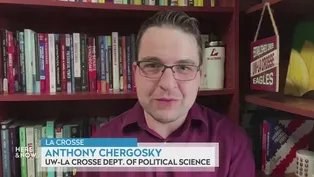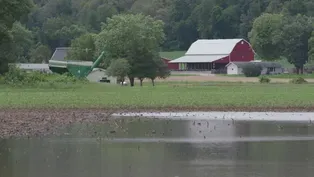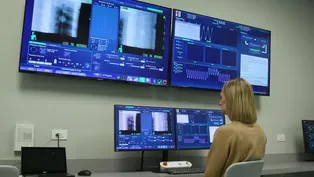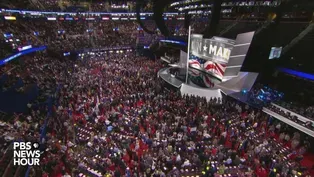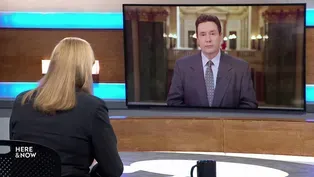Here and Now
Natasha Paris on Wisconsin's Farms Facing Weather Whiplash
Clip: Season 2300 Episode 2301 | 5m 19sVideo has Closed Captions
Natasha Paris on impacts of extreme weather conditions on Wisconsin's growing season.
UW-Madison Extension regional crops educator Natasha Paris describes the impacts of extreme weather conditions on Wisconsin's growing season as drought shifts to rainstorms delivering excessive water.
Problems with Closed Captions? Closed Captioning Feedback
Problems with Closed Captions? Closed Captioning Feedback
Here and Now is a local public television program presented by PBS Wisconsin
Here and Now
Natasha Paris on Wisconsin's Farms Facing Weather Whiplash
Clip: Season 2300 Episode 2301 | 5m 19sVideo has Closed Captions
UW-Madison Extension regional crops educator Natasha Paris describes the impacts of extreme weather conditions on Wisconsin's growing season as drought shifts to rainstorms delivering excessive water.
Problems with Closed Captions? Closed Captioning Feedback
How to Watch Here and Now
Here and Now is available to stream on pbs.org and the free PBS App, available on iPhone, Apple TV, Android TV, Android smartphones, Amazon Fire TV, Amazon Fire Tablet, Roku, Samsung Smart TV, and Vizio.
Providing Support for PBS.org
Learn Moreabout PBS online sponsorshipand future generations.
>> For "Here& Now, I'm Stephen Potter.
>> Turning to agriculture, experts are calling it a weather whiplash.
First, too much dry weather caused drought in Wisconsin.
Now there's too much rain for farmers and their crops are feeling the effects.
We turn to Natasha Perez, covering central Wisconsin as regional crops educator with UW-Madison extension, who joins us from Green Lake.
And thanks very much for being here.
>> Thanks for having me.
>> So describe the weather whiplash, as you call it.
How severe is it, >> well, last year at this time, we had just experienced our fourth driest May on record and our 10th, driest June on record, and we were still in drought here in Green Lake County into the end of May.
And now here in Green Lake, we aren't in drought anymore.
And in fact, we've had excess amounts of rain.
And, statewide we had the 10th wettest May on record.
And the numbers are still being finalized, but we're looking at being in the top ten wettest Junes as well.
>> So where in the state is the worst of the water access, >> it's really in that north central region, spanning kind of from the northeast over to the north central, there's, there's kind of this, this band, across, I think it's in marathon, Lincoln, Langlade area, that's, that's that's had an excess amount of rain.
And I've heard from folks up there that there really haven't been able to get a lot of their crops in, and there's a lot of fields that are just standing empty or the crops have failed.
Yeah, that was what I was going to ask is what has been the effect on crops?
Yeah So, we have we have fields where, the, the crops were able to get in early and, sometimes they've made it through and done and done pretty well.
But then sometimes they got caught in those absolute deluges of rain and they, they, they were drowned out.
So we've been talking about things like replant, or there's, there's cases where they've just never been able to get in the fields at all.
And so we're looking at, at what we call a prevented plant situation where you if you have the right crop insurance, you might be able to receive some type of payment.
But there's a lot of fields where, the corn was planted a month late, if not more.
>> So what are what are farmers telling you about their their mood with all of this right now, it really depends on the farm.
>> It depends on what they're growing for, I, you know, they're they're they're for the some of them are feeling are really feeling the pinch in terms of if they are a dairy farm and they planted a new seeding of alfalfa and they weren't able to get much out of it or the, the alfalfa that they have been able to harvest because it was delayed, because it was so wet, the quality isn't very good.
And so you're just not getting going to get as many pounds of milk out of that.
So that's really been putting a pinch on some of our dairy farmers.
notes manure runoff risk.
Is that an overall risk or more so in specific places in the state, >> well, it's a risk based on soil type and topography.
So areas where we have those, those, those, those clay soils, and the Filthier soils that are, that are going to move more easily, that can that can cause risk.
And then, obviously on areas where there's, there's more hills and then also the type of tillage and the type of cropping system being used.
And so there's been some rain events this year that have kind of overdone whatever cropping system has been in place, but so we've been really trying to, to help people use the tools that are available to assess the intensity of the rainfall that could be predicted, to better to time their manure applications, to, to prevent runoff.
>> So gauging what you're seeing to date, what does the rest of the growing season hold?
Well, we are we're looking at, a little bit warmer, a little bit, a little bit wetter.
>> July, but then over the course of the summer as a whole, we're looking at warmer.
There's not a clear signal yet.
About what?
About being wet or dry, and so at this point, those who have really had these early season struggles are hoping for some, some, break in the rain so that they can at least get established.
Maybe, maybe an alternative forage here in the in the, high summer to be able to grow some feed for the animals, and those who are growing for grain purposes are looking at, really dialing in their, their disease management because this hot, wet weather is going to really kick up the incidence of disease that we're having in, in our crops.
And so really making sure that we're timing those fungicide applications at the right time.
So we can counteract disease that can affect yield and quality.
Anthony Chergosky on Down-Ballot Races in the 2024 Election
Video has Closed Captions
Anthony Chergosky on the 2024 presidential race affecting votes for the state Legislature. (5m 41s)
Here & Now opening for July 5, 2024
Video has Closed Captions
The introduction to the July 5, 2024 episode of Here & Now. (1m 10s)
How Wisconsin Is Creating the Future of Precision Medicine
Video has Closed Captions
Wisconsin's federal designation as a biohealth technology hub is generating high hopes. (6m 3s)
What's the Purpose of the RNC in Milwaukee, DNC in Chicago?
Video has Closed Captions
The RNC in Milwaukee, DNC in Chicago will command attention as the 2024 race intensifies. (2m 52s)
Zac Schultz on the Wisconsin Supreme Court and Abortion Law
Video has Closed Captions
Zac Schultz on the Wisconsin Supreme Court hearing cases on the legal status of abortion. (4m 58s)
Providing Support for PBS.org
Learn Moreabout PBS online sponsorshipHere and Now is a local public television program presented by PBS Wisconsin
